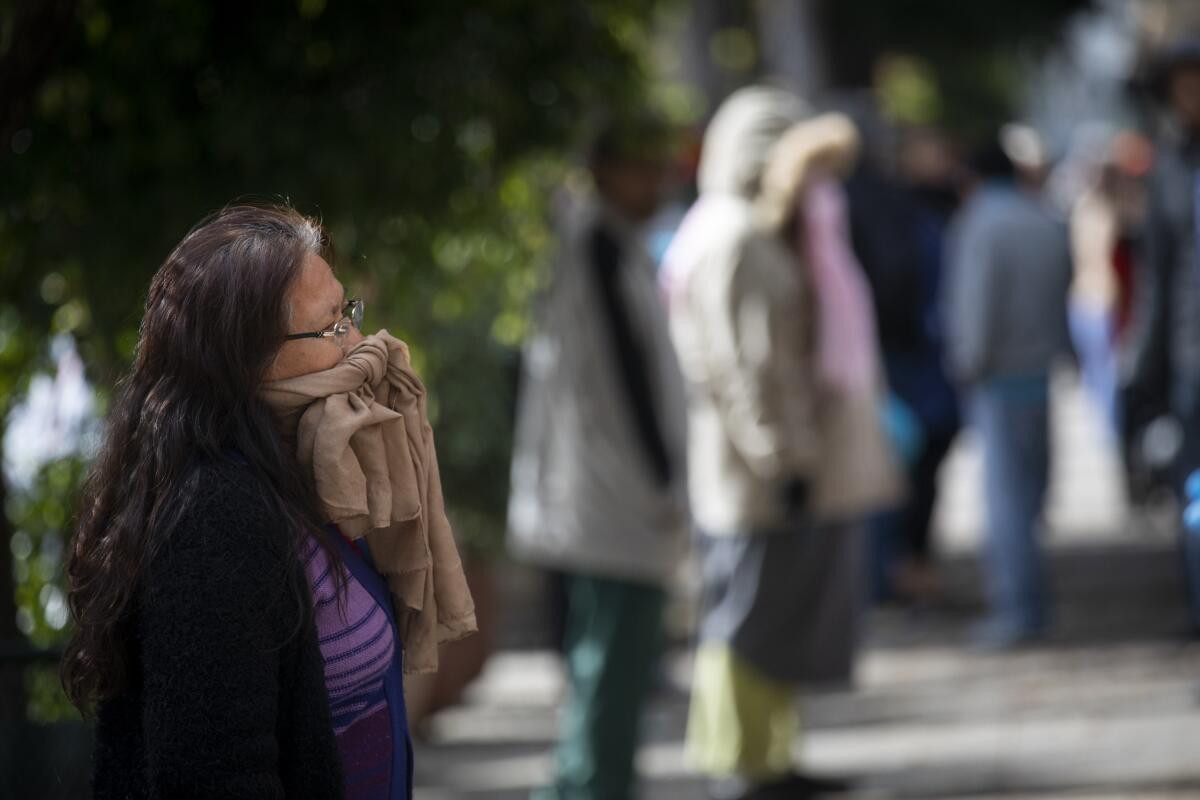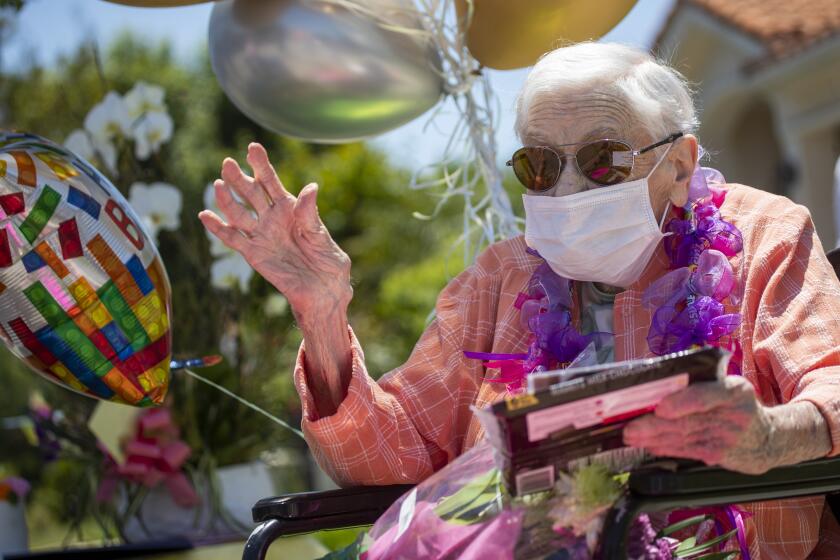Already devastated by the coronavirus, seniors stand to lose again in Newsom’s budget

- Share via
SACRAMENTO — Do you kick impoverished old people in the shins now or wait until the feds can join in?
Or maybe Washington will protect the seniors by sending Sacramento billions more to fund their critical services. It’s unlikely but possible.
Or perhaps legislators and the governor will agree to ease up on seniors and pick on something else — such as good government.
These are the options the Legislature and Gov. Gavin Newsom have been arguing over in their efforts to negotiate agreement on a new pandemic-pummeled state budget.
Lawmakers must pass a budget by midnight Monday or lose their pay for every day it’s delayed. So they’ll pass something.
But in violation of the deadline spirit — if not letter of the law — their product won’t be a complete budget. It will contain huge holes to be filled later by what’s being called “Budget Junior.” Junior presumably will be negotiated and passed before the new fiscal year begins July 1. Or in late summer. Who knows?
So Monday’s budget will mainly be a stopgap salary-saver. In coming days, there’ll also be budget “trailer bills” that will follow with details.
It’s ironic: COVID-19 hit vulnerable seniors the hardest. To control the coronavirus spread, Newsom and other state governors crippled the economy. Inevitably, this greatly diminished tax revenues that fund programs for needy seniors. Now, seniors are hammered not only by the virus but also by the potential loss of crucial government services.
It’s a double whammy.
Here’s the landscape in Sacramento: Newsom projects a $54-billion hole in the budget that he originally proposed in January. So last month, he downsized his budget request by $19 billion, down to a total $203 billion.
Gov. Gavin Newsom’s program to deliver meals to California seniors hasn’t lived up to his projections.
Among the governor’s whacks were $14 billion in “trigger” cuts. These severed programs — mainly in education and health and human services — would be triggered back into existence if Congress and President Trump send the states another huge pandemic relief package.
“Nothing breaks my heart more than making budget cuts,” Newsom told reporters when he proposed them. “There’s a human behind every single number … a dream denied.”
Advocates for seniors I talked with told me they’re really tired of hearing “breaks my heart” language from the governor and other politicians. It fits into the same script book with “thoughts and prayers” after mass shootings.
Anyway, the Legislature has rejected Newsom’s idea. Instead, it wants to reverse the trigger concept. Under the legislators’ plan, the cuts would be triggered only if the feds don’t come through with billions — and even then probably not.
The Legislature would prefer to borrow, defer some spending, turn to accounting gimmicks and empty the “rainy day” reserve bucket — the traditional playbook for budget deficits, except this is the first time there has been a reserve. Lawmakers could also, on paper, arbitrarily reduce the projected deficit and raise revenue expectations.
That’s bad government. But worse is smacking low-income seniors, many of them frail and disabled.
“Why don’t we continue the programs until we find out for sure whether the federal funding is coming?” says Assemblyman Adrin Nazarian (D-North Hollywood), who chairs the Aging and Long-Term Care Committee. “Once we know it’s not coming, then we can make the cuts.”
Newsom wants to get it done and over — not kick the can down the road. Problem is, that immediately kicks struggling seniors.
Hardly anyone wants to raise taxes.
“They’re not going to do that in an election year,” says Marty Omoto, director of the California Disability Senior Community Action Network. “That could affect retention of Democratic congressional seats and the legislative supermajority. Even Democrats don’t want to do that yet on businesses not fully back.”
“We’re all nervous as hell because we don’t know what [cuts] they’re ultimately going to agree to.”
Nazarian says of taxes: “We’re trying to avoid doing that because we have implemented quite a few taxes over the last five or six years.”
But he adds: “There already are some conversations about ‘how do we pay for long-term care?’ — whether there should be a small payroll tax that goes into a long-term-care fund. In the next 15 years, we’re expecting the senior population to grow from 12% [of the population] to 25%.”
Maybe not if we don’t get a vaccine for the coronavirus fairly soon. And all those proposed cuts to senior programs could force old folks into nursing homes where they become much more vulnerable to being infected with the virus. “They’re cutting what people need to stay out of assisted care facilities or nursing homes,” says Blanca Castro, California advocacy director for AARP.
“The last place you should target for cuts is older people during a pandemic,” says Anthony Wright, executive director of Health Access California, an advocacy coalition. “These are the programs that should be the response to the pandemic — not the things we cut in this emergency.
“It’s troubling to see how many of these [COVID-19] deaths are in nursing homes. You’d expect we would double down to keep people from going into these homes.”
Among the programs lined up for sharp whacks or even the dumpster: in-home supportive services. And community centers where seniors can engage with social workers and other old folks.
Newsom also proposes to make it harder to qualify for Medi-Cal by making sure you’re worse off than merely poor.
So kick the can. This is a case when bad government becomes good government.
More to Read
Sign up for Essential California
The most important California stories and recommendations in your inbox every morning.
You may occasionally receive promotional content from the Los Angeles Times.











